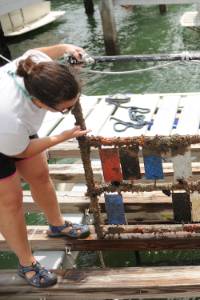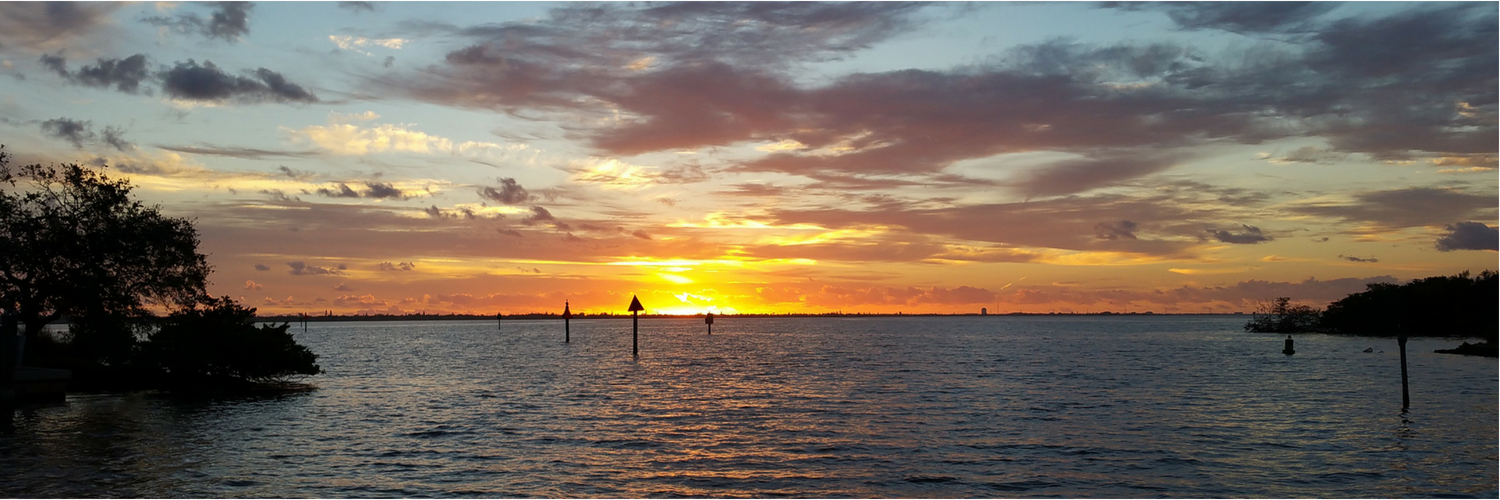Get A Master's In Environmental Resource Management

Interest in environmental resource management continues to grow due to the increasingly complex environmental challenges found around the world. Graduates with a master’s in environmental resource management are the scientists, conservationists, and problem-solvers who lead collaborative teams from consulting firms, government agencies, and nonprofit organizations to solve today’s environmental issues.
In addition to the fundamentals of biological and chemical environmental processes, students are knowledgeable in local and global cause-and-effect relationships of human activities in the development and use of environmental resources. Students learn how to analyze and manage natural environments for human benefit while maintaining ecosystem health. This is a non-thesis master's program.
Experienced, Respected Faculty
Small class sizes bring students and professors together for mentorship and support. Florida Tech professors have high praise from the North American Association for Environmental Education (NAAEE). Students also benefit from an interdisciplinary approach in the master’s in environmental resource management program through interaction with science and engineering faculty.
Learning Extends Beyond the Classroom
Learning extends far beyond classroom studies into fieldwork for the development and application of resource management plans in local wetlands and coastal environments. Due to the university’s close proximity to the Atlantic Ocean, the Indian River Lagoon estuary, and other diverse ecosystems, students in the master’s in environmental resource management have access to numerous research labs, centers, and institutes to perform research, collaborating with fellow students and professors.
“Why Pursue A Master's In Environmental Resource Management At Florida Tech? ”
You already know we have your major.
Now learn everything else you want to know!
Keep it simple.
Get the facts about graduate studies at Florida Tech
You have two graduate study opportunities:
- On Campus
- At an Education Center near you Get the Education Center Brochure
You have three graduate study opportunities:
- On Campus
- At an Education Center near you
- 100% Online Learn more about Florida Tech Online
Get the Education Center Brochure
You have two graduate study opportunities:
- On Campus
- 100% Online Learn more about Florida Tech Online
You have two graduate study opportunities:
- At an Education Center near you
- 100% Online Learn more about Florida Tech Online
Get the Education Center Brochure
Florida Tech’s environmental resource management master’s program is the perfect choice for students who want to work with environmental agencies around the world, collaborating with engineers, scientists, managers, and politicians interested in environmental issues.
Graduates from Florida Tech are prepared for career opportunities having completed coursework and research based on the latest body of technical knowledge in the industry. With professors who bring a wealth of experience to the classroom, and a culture that empowers graduates to be future leaders, Florida Tech offers students seeking an environmental resource management master’s degree the perfect opportunity to prepare for the complex environmental issues they’ll face in their career.
A Hands-On Program
Working toward an environmental resource management master’s degree means getting out in the field and experiencing the environment. With access to nearby natural laboratories, including the Atlantic Ocean marine ecosystem, the estuarine habitats of the Indian River Lagoon, and the area’s other natural resources, students are exposed to a wide range of courses and fieldwork that develop the skills they need to become environmental resource managers.
Small Class Sizes—Personalized Learning Environment
Because of small class sizes and a close-knit academic community, environmental resource management master’s degree students have the benefit of individualized attention from professors to explore their interests and develop a personal career path. Students often collaborate on faculty research projects and publish findings in research journals. Graduate students also participate in internships with prestigious organizations such as the Audubon Society, Save the Manatees, and the Harbor Branch Oceanographic Institute.
Research Opportunities
Research is the foundation of every degree program at Florida Tech. Non-thesis research topics are available as part of the master’s in environmental resource management. These topics can include natural habitat restoration, remote sensing, biofouling, and more. Whenever possible, students are encouraged to engage in studies that make a contribution to the field at the local, regional, state, or national level.
High-Tech Laboratory Facilities
Florida Tech’s state-of-the-art facilities and labs are available to all environmental resource management students. The F.W. Olin Engineering Complex, F.W. Olin Life Sciences Building, and L3Harris Center for Science and Technology provide comprehensive research laboratories equipped with 21st century technology. The latter is a teaching and research laboratory that includes an aquarium facility, climate change institute, and research labs. The Ralph S. Evinrude Marine Operations Center gives students and faculty direct access to the Indian River Lagoon. Students in the master’s in environmental resource management program use local wetlands and coastal environments for management related class projects.
Great Florida Location
Many environmental resource management master’s degree students are working professionals in the area, but the university’s location attracts students from around the world for access to Florida’s subtropical climate that offers year-round warm weather and proximity to many diverse ecosystems.
“What Environmental Resource Management Research Or Other Opportunities Can I Expect? ”
Research conducted by Florida Tech students is an important academic experience that provides students with the tools and techniques they will use in future career-related scientific research or analyze as manager of an environmental program.
An environmental resource management internship at Florida Tech provides students an opportunity to work with prestigious environmental organizations including:
- The Audubon Society
- The Marine Resources Council of East Central Florida
- Save the Manatees
- The Center for Coastal Studies
- The Harbor Branch Oceanographic Institute
Students have an opportunity to venture into diverse Florida environments to better understand their fragile and complex natures in an environmental resource management internship. Topics of interest for current students involve the development and application of resource management plans in local wetlands and coastal environments, due to Florida Tech’s close proximity to diverse ecosystems and high-tech facilities.
Research topics explored include:
- Natural habitat restoration
- Sustainability
- Renewable energy
- Global climate monitoring
- Environmental protection
- Remote sensing
- Biofouling
- Environmental chemistry
Capstone Management Plan
In addition to an environmental resource management internship, fieldwork and classroom study are put to the test with the development of a resource management plan that is done in collaboration with a local agency, scientific organization or private firm. This capstone management plan not only gives students an opportunity to apply their curriculum to real-world scenarios, but also builds portfolios, as many are put to use as actual action plans.
Enhance Your Degree and Career with Campus Groups
The Student Organization for Sustainability Action (SOSA) is dedicated to the practice and implementation of sustainable practices for the Florida Tech community. The organization strives to identify and apply sustainability advances not just at Florida Tech but also throughout all colleges, campus facilities and support services.
The Florida Tech Environmental Club exists to better serve environmental awareness on campus, increase environmental friendliness and create a community of like-minded individuals who share ideas and engage the Florida Tech community through service, fundraising, and events.
“How Will A Master's Degree Benefit My Environmental Resource Management Career? ”
Environmental resource managers work to protect the environment, conserve natural resources, improve air and water quality, assist with sustainable development, clean up contaminated ecosystems, and more.
An environmental resource management career can be found in government agencies at the local, state, and federal levels, as well as environmental consulting firms, nonprofit organizations (such as conservancies), and in higher education. Environmental managers often interact with engineers, scientists, other managerial leaders, and politicians on the environmental issues that face humankind.
Graduates with an environmental resource management master’s degree are well prepared for rewarding careers as consultants and managers in environmental agencies. Outside of formal management positions, many graduates choose to work as private consultants to federal agencies, engineering firms, government entities and nonprofit agencies. Many graduates also choose to continue in academia pursuing advanced research.
Career Outlook
Graduates with a master’s in environmental resource management find careers with environmental agencies around the world. Interacting with engineers, scientists, managers, and politicians, graduates are prepared for positions such as environmental project manager, environmental protection director, environmental compliance manager, or federal natural resources consultant.
The Occupational Outlook Handbook, published by the US Department of Labor’s Bureau of Labor Statistics (BLS), provides information about specific jobs including median annual pay, working conditions and job outlook, among other things.
Employment of environmental scientists and specialists is projected to grow 15% from 2012 to 2022. While one area of growth is expected to be in private consulting, an environmental resource management career can also include a position as a compliance officer, remediation manager (clean-up of contaminated environmental sites), or managerial position in land planning and conservation.
Environmental Resource Management Careers
Although not an exhaustive list, an environmental resource management career could include:
- Air quality program director
- Environmental compliance director
- Land use manager
- Sustainability specialist
- Natural resources conservation manager
- Policy and regulation specialist
- Director of conservation program
- National resource specialist
- Environmental protection specialist
- Wetlands program director
- Environmental quality director


 Give to Florida Tech
Give to Florida Tech 